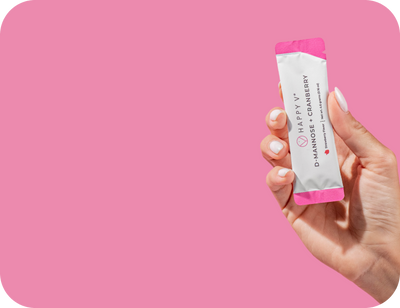- Fact Checked
- August 07, 2025
- 10 min read
Exploring D-Mannose: A Science-Backed Approach to Urinary Tract Health
Table of Contents
Table of Contents
Most people don't really think a whole lot about their urinary health... until they experience recurring urinary tract infections (UTIs)1. Then they think about it A LOT.
If you're in that boat and searching for ways to end the cycle of infection once and for all, you may have heard about something called D-Mannose. D-Mannose is a naturally occuring sugar found in fruits like cranberries and apples and has been getting a lot of buzz on social media for its ability to prevent UTIs. But is there any science to support this buzz?
That's what we're here to talk about. We'll share everything we know about D-Mannose so you can decide if it's right for you.
This post is for informational purposes only and does not constitute medical advice. See full disclaimer below.
The Importance of Urinary Health & Recognizing the Signs of Trouble
Urinary health doesn't get talked about a whole lot, but it's actually really important. It's how your body filters waste and regulates fluids2. When everything is working as it should, you don't even think about it. But when something is off, you know it. How do you know it? Because you have a really, really uncomfortable urinary tract infection.
Urinary tract infections, or UTIs, are incredibly common. They account for 8-10 million doctor visits every year, just in the US alone. They occur when bacteria, most often E. coli, enter the urinary tract and cause infection3. While anyone can get a UTI, women are especially prone to them4, given their shorter urethra.
Like we said, the signs of a UTI are often hard to miss and include:
- A frequent, urgent need to urinate5
- A burning or stinging sensation when you pee
- Cloudy, dark, or foul-smelling urine
- Lower abdominal or pelvic discomfort
- Feeling tired, shaky, or generally unwell
- Fever or back pain (which can signal a more serious infection)
These signs should never be ignored. Ignoring a UTI can lead to more serious complications, including kidney infections. Make an appointment with your doctor at the first sign of an infection.
What Is D-Mannose?
D-Mannose is a naturally occurring simple sugar found in fruits like cranberries, apples, oranges, peaches, and pears, as well as coffee beans and baker's yeast. D-Mannose is technically a monosaccharide, which means it's made up of just one sugar molecule67.
How D-Mannose Supports Your Urinary Health
D-Mannose has been gaining attention as a natural way to support urinary tract health, especially for those of us dealing with urinary tract infections (UTIs) more often than we’d like.
Some early research and lab studies suggest that D-Mannose can interfere with E. coli (aka the bacterial culprit behind most UTIs) by stopping it from sticking to the lining of the bladder, urethra, urinary tract, and vagina. Instead of latching on and causing trouble, the bacteria bind to the D-Mannose and get flushed out when you pee. Pretty cool, right?
Another reason people are turning to D-Mannose instead of (or alongside) antibiotics? It’s fast-acting and doesn't harm your helpful bacteria8. Plus, it may help reduce the risk of antibiotic resistance, which is becoming an increasing concern in the treatment of infectious diseases.
A 2013 randomized clinical trial involving 308 adult women found that D-Mannose worked just as well as a commonly prescribed antibiotic (nitrofurantoin) in preventing recurrent UTIs. A 2014 follow-up study reported D-Mannose helped relieve UTI symptoms during active infections—and was even more effective at preventing new ones compared to the control group.
Another pilot study noted that over 90% of participants felt better within three days of taking D-Mannose. While these results are promising, larger meta-analysis and systematic reviews are still needed to confirm the effectiveness of D-Mannose across different demographics and baseline conditions.
D-Mannose vs. Antibiotics: What’s the Difference?
When it comes to treating and preventing urinary tract infections (UTIs), antibiotics have long been the go-to option. They work by directly targeting and killing the bacteria responsible for the infection, often providing quick relief. But frequent or long-term use of antibiotics can throw off the balance of healthy bacteria in your body and contribute to the growing problem of antibiotic resistance—a serious public health issue that can make future infections harder to treat and limit your options down the road9.
Because of these challenges, both patients and healthcare professionals are increasingly interested in non-antibiotic alternatives and additional ways to support urinary health. aD-mannose has emerged as a promising option, especially for those dealing with recurring infections.
Recent studies have compared D-mannose directly with antibiotics for both treatment and prevention of UTIs10. Some clinical trials and reviews suggest that D-mannose may be just as effective as certain antibiotics (like nitrofurantoin) in preventing recurrent UTIs, and may also help ease symptoms when used alongside antibiotics during active infections. For example, one randomized clinical trial found that women taking D-mannose had a similar reduction in UTI recurrence as those taking nitrofurantoin, and a 2022 study suggested comparable cure rates between D-mannose and antibiotics for acute infections.
That said, the science is still evolving. While several studies show promise, especially for prevention, other research, including larger and more recent trials, has found less consistent results. Current medical guidelines still recommend antibiotics as the first-line treatment for active or complicated UTIs. Experts stress that D-mannose shouldn't replace antibiotics in cases of serious infection, and putting off proper treatment can lead to more serious complications.
For this reason, many healthcare providers see D-mannose as a helpful complement to antibiotic treatment, or as part of a prevention plan, rather than a full replacement. This kind of approach can reduce unnecessary antibiotic use and help lower the risk of resistance, while still making sure active infections are treated effectively.
Dr. Barry Peskin, an OB-GYN with more than 20 years of experience in women’s urinary health, shares his perspective:
“As a clinician, I certainly don't want to overprescribe antibiotics. For my patients who struggle with chronic UTIs, I explain that D-Mannose isn't a cure-all, but it can be a helpful prevention tool, especially when combined with good hydration and healthy eating habits. It's often a really encouraging conversation, with most patients feeling empowered to take control of their urinary tract health.” - Dr. Peskin
To put a long story short: antibiotics are still essential for treating active or severe UTIs and preventing complications, but D-mannose offers a promising, non-antibiotic way to help break the cycle of recurrent infections and reduce reliance on antibiotics over time. As always, the best next step is to talk with your healthcare provider about what’s right for you.
Who May Benefit
If you’ve ever felt stuck in the never-ending loop of recurrent urinary tract infections or frequent UTIs, D-Mannose might be worth chatting with your clinician about.
It could be especially useful if you:
- Are sexually active with multiple partners
- Use urinary catheters11
- Are going through menopause or are a postmenopausal woman
- Are pregnant
- Live with diabetes (lower immunity and less of the antimicrobial peptide psoriasin can raise your risk)
- Have kidney stones or hormonal imbalances
- Are recovering from urinary surgery
It’s not just for women, either. Men can benefit too, especially those with risk factors like chronic health issues or catheter use. It may also support patients in primary care or urology settings as part of a prophylactic or non-antibiotic urinary health strategy.
Use, Dosage, and Safety
How much D-Mannose should you take? That depends on whether you’re using it to treat UTIs or for UTI prevention:
- Acute UTIs: 2g every 2–3 hours (then taper as symptoms ease)
-
Daily prophylactic use: 1g once a day, or split into smaller doses throughout the day
Always read the instructions on your dietary supplement label and check in with your healthcare provider before starting, especially if you’re pregnant, breastfeeding, managing diabetes, or taking other medications.
Pro tip: If you’re using D-Mannose powder during an active UTI, drink lots of water! That extra hydration helps flush out bacteria more effectively.
If your symptoms don’t improve or if they worsen (think: fever, nausea, chills), definitely contact your doctor. Some complicated UTIs or bacterial infections require urgent antibiotic treatment.
Side Effects
D-Mannose is generally considered safe for most people, but like any supplement, it's important to be aware of possible side effects and risks, especially if you have underlying health conditions.
Most people don't have any issues or side effects with D-Mannose. Those who do experience side effects may report mild digestive issues like loose stools/mild diarrhea, bloating. or gas.
Generally, these digestive symptoms are temporary and tend to occur at higher-than-recommended doses. Taking very large amounts of D-Mannose can also put stress on the kidneys, particularly in people with existing kidney problems. If you have a history of kidney disease or impaired kidney function, it's important to consult your healthcare provider before using D-Mannose.
Since D-Mannose is technically a sugar, anyone with diabetes should also use caution, consult their doctor, and monistor their blood glucose regularly while taking any form of supplement.
Beyond UTIs: Bacterial Vaginosis and Gut Health
BV (bacterial vaginosis) affects over 21 million women in the U.S. every year. It occurs when the balance of good and bad bacteria in the vagina gets thrown off.
While antibiotics are typically prescribed for active cases, D-Mannose may offer additional support in maintaining vaginal flora and possibly preventing reinfections.
There’s also some discussion about D-Mannose acting as a prebiotic, aiding in the growth of beneficial microbes. In combination with probiotics, it may support gut health and reduce inflammation, contributing positively to immune system balance and overall quality of life12.
Supplement Selection and Considerations
When choosing a D-Mannose supplement, there are some important factors to consider, like:
- Is it clean and additive-free?
- Is it available in a form that's easy to take? (People have different preferences when it comes to a capsule, powder, or tablet.
- Is it dosed at the right level? (This should be easy to see on the label.
With Happy V, you can confidently answer "yes" to all these questions. Plus Happy V combines D-Mannose with cranberry for additional UTI support. Like D-Mannose, cranberries contain compounds that help flush unwanted bacteria from the urinary system. When taken together, D-Mannose and cranberry may help reduce the risk of recurrent urinary tract infections when used consistently.
Just remember, these supplements are best used as part of a prevention plan, not to treat an active infection. Any UTI symptoms require a visit to your doctor.
D-Mannose + Cranberry
Supports urinary tract health and promotes long-term wellness.
Final Thoughts
D-Mannose may not be a silver bullet for chronic UTIs, but the science around it is compelling and should definitely be discussed with your doctor if you are looking to avoid reinfection (and the antibiotics that come along with them). Just remember to shop smart when it comes to D-Mannose supplements and incorporate D-Mannose into a larger prevention plan that includes good hygeine and lots of hydration.
Keep the Conversation Going
- Visit our blog for more women’s health tips.
- Join our private Happy V Facebook group to hear from others who’ve been there.
- Explore supplements designed to support your vaginal health journey.
Disclaimer: This blog is for informational and educational purposes only and is not intended to diagnose, treat, cure, or prevent any disease. Statements about supplements have not been evaluated by the Food and Drug Administration. For more information about vaginal infections, visit the CDC or speak to a licensed healthcare provider.










